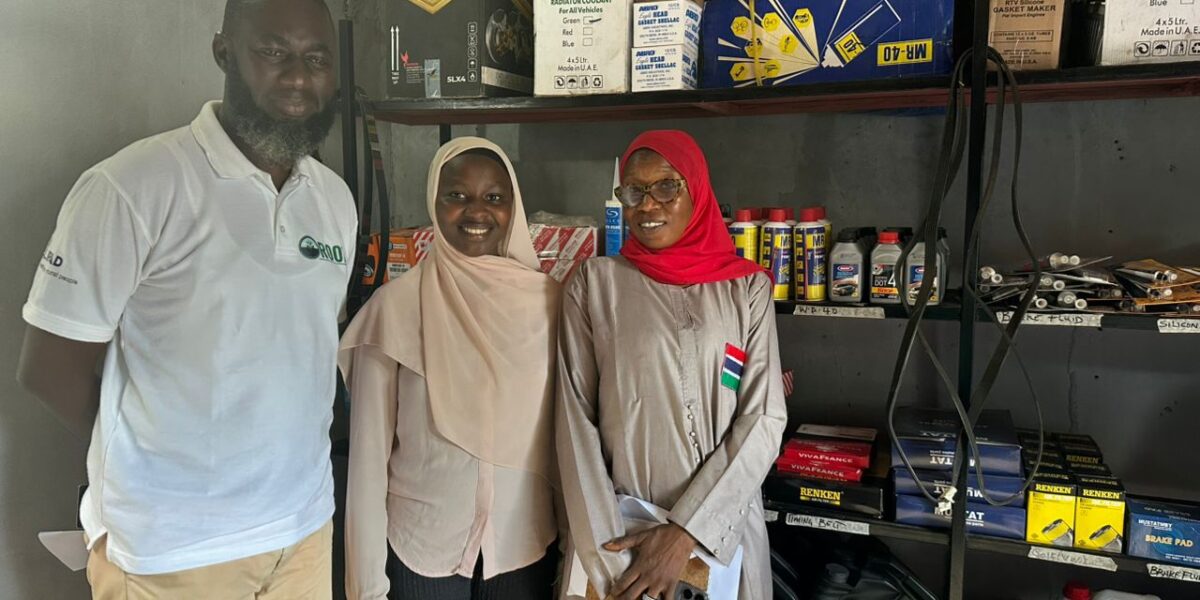From rice fields to cold storage and youth empowerment, the final day showcased sustainability and impact in the West Coast Region (WCR).
The final day of the National Steering Committee (NSC) field visit began in Berefet, where the team met with members of the Berefet Women Rice Farmers Cooperative Society, beneficiaries of the ROOTS Subsidized Rice Input Support (Year 2).
Vice President Nyanya Sanyang welcomed the delegation, followed by Amie Krubally, who explained that the group started with 15 hectares in the first year and expanded to 20 hectares this year. The cooperative has 100 members (10 men, 40 women, and 50 youth) and received ploughing services for 20 hectares, 1,040 bags of rice seeds, 120 bags of fertilizer (80 NPK, 40 Urea), and 60 litres of herbicide.
“We are expecting a bumper harvest, and many of our members are still eating rice from last year’s produce,” Amie Krubally.
Alkalo Alagie Gassama commended ROOTS and the RCU for their continued support, noting that his family is still using rice from last year’s harvest. He praised the women for their dedication and urged everyone to rally behind them to boost rice production.
DPS Fatou Jammeh-Touray Team Lead highlighted that the promising rice fields are a clear sign of success when projects invest in smallholder farmers. She asked about sustainability plans, and Jainaba Sawo explained that members contribute D500 at the end of every season, and each household contributes D400 annually to the cooperative account. The group also owns a tricycle that generates income and maintains a rice seed genebank to ensure future seed availability.
Mr. Lamin Darboe from the Department of Agriculture encouraged men to continue supporting women’s efforts to achieve food self-sufficiency. Mr. Tom Senghore recognized the genebank initiative and promised to explore partnership opportunities through his office.
The group noted challenges such as salt intrusion, blast at the maturing stage, and lack of equipment (tractors, power tillers, combine harvesters), which forces them to harvest manually.
The team then visited the Pirang Cold Storage Facility, implemented under a Matching Grant with the Fangsoto Marketing Federation.
Chairperson Ousman Manneh explained that the federation facilitates market linkages and helps prevent post-harvest losses across the vegetable value chain. With 5,365 members (58 farmer groups across 9 districts) most being women the facility will help reduce spoilage during peak production and ensure year-round vegetable availability.
“This cold store will solve one of our biggest challenges post-harvest loss. We thank ROOTS for the foresight,” Ousman Manneh, Fangsoto Federation.
He assured that the federation will complete their 10% contribution to the project by the end of October, with the facility expected to be handed over by November 2025.
Mr. Darboe Deputy Director Admin (DoA) advised them to introduce individual membership contributions for sustainability and establish a strong management committee to ensure the facility serves its purpose effectively.
Next, the team visited Giboro Kuta Kambeng Kaffo Cooperative Society, a 128-member group (10 men, 118 women, 46 youth).
Alkalo representative Papa Jarju welcomed the team and thanked ROOTS for its life-changing support.
Omar Jatta outlined their sustainability plan: a D100 registration fee and D250 seasonal contribution per member, both saved in the group’s bank account. The project has supported the garden with:
Water facilities (solar-powered borehole, overhead tank, reticulation system, and upgraded reservoirs)
Farmhouse rehabilitation and garden demarcation
Assorted vegetable seeds, simple farm tools, and ploughing services
The group recently began rainy-season production and is preparing for the dry season. They have also benefited from training in cooperative management, bookkeeping, GALS, L&N skills, FFS, GAP, and pest management.
They are part of the NARI Biofortification Program, growing nutrient-dense crops like orange-fleshed sweet potatoes and cassava.
“ROOTS has helped us eat healthy vegetables and save money at home. We even run small savings from soap and Omo sales to sustain our activities,” Giboro Kuta member.
Challenges include pest infestation (now managed with guidance from Plant Protection) and lack of transport for moving produce to markets.
Papa Jarju proudly shared that his family has been eating onions produced from the garden for the past seven months a testament to the project’s lasting impact.
The day also featured a courtesy call to the Governor of the West Coast Region.
PD Mamour Jagne thanked him for his strong collaboration with the ROOTS Regional Support Committee, particularly in resolving the cold storage land issue.
The Governor commended ROOTS, saying the impact of the project is visible in every corner of the region.
“I’m impressed with what I’ve seen. ROOTS is making a difference, and more communities should be sensitized about its great work,” Governor, West Coast Region.
The final visit was to Jainaba Jammeh (JJ Auto Mechanic), a Youth-Based Matching Grant beneficiary. A trained and passionate mechanic, Jainaba said it had always been her dream to own a mechanic shop a field largely dominated by men.
She started operations in April 2025 and currently employs one person while building her own garage that will include a store. She received spare parts and a key programmer from the project but is yet to receive the tools for tricycle repair.
“Being a female mechanic inspires many young women. ROOTS has made my dream a reality,” Jainaba Jammeh.
Her main challenge is securing a strategic location along the highway for greater visibility and access.
The NSC field mission concluded with reflections on the diverse impacts of ROOTS — from empowering women and youth to strengthening cooperatives, improving post-harvest management, and promoting sustainable food systems across The Gambia.


